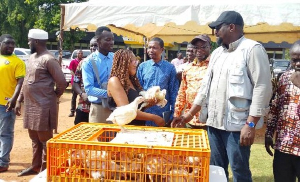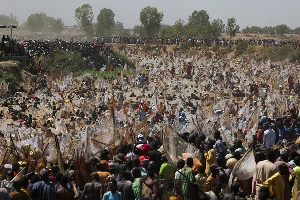Ghana is among three African countries that began implementing the RTS,S malaria vaccine in selected areas in May 2019 on a pilot basis.
It is almost two years since the malaria vaccine implementation programme (MVIP) rolled out in 42 Districts in seven regions in the country, and it is administered to eligible children who receive the vaccine from the age of 6 months, with the final dose given at 24 months of age.
The South Dayi District, located in the Volta region of Ghana, is one of the 42 Districts selected to pilot the malaria vaccination programme.
McAnthony Dagyenga visited the South Dayi District to ascertain how the District is progressing with malaria vaccination.
The visit is part of a tour of districts organised by the African Media and Malaria Research Network (AMMREN).
Global statistics indicate that more than 400,000 deaths are attributed to malaria each year. Ghana records an estimated 11,070 malaria deaths with that of under-five mortality pegging at 5,607.
Information also suggests that African children are at the highest risk of dying of malaria and malaria accounted for more than 265,000 deaths of children in Africa in 2019
In an interview with the South Dayi District Health Director, Ms. Patience Nunoo, she indicated that even though malaria constitutes one of the leading causes of morbidity in the District, steady progress is being made towards using a range of malaria interventions to control the disease, especially among children.
“More children are being (vaccinated). If you look at the RTS,S intervention, about 60 to 70 percent of the children are being given the vaccine in the District.
“From May to December 2019, a total of 899 children were immunised with the RTS,S1 while a total of 691 children were given the second RTS,S dose, and for the RTS,S third dose, 466 children were immunised.
“For 2020 between January to December, 1,293 children were vaccinated with the RTS,S1 and for the RTS,S2 a total of 1,229 children got vaccinated while 1,190 children received the RTS,S3. Between September and December same year, a total of 132 children who had attained the age of 24 months qualified to receive the RTS,S4.
“For this year (2021) from January to February, 221 children have received the RTS,S1 while 226 children have received the RTS,S2. For the RTS,S3, a total of 212 received it and for the RTS,S4, 93 children have been immunised,” she recounted.
Ms. Nunoo disclosed that at the initial stages of the malaria vaccine immunisation, many nursing mothers were reluctant to get their children immunised with the vaccine since it was new to them and since some nearby Districts were not implementing the malaria vaccine.
She also disclosed that the parents complained about too many vaccinations on their babies which makes some of them ran high temperature and thus, brings discomfort to the parents.
So far, in addition to the malaria vaccine, there is currently about 11 vaccinations to one child. These 11 vaccinations come in a different number of doses which sum up to 23 doses to one child.
According to the Health Director, some of the parents revealed that the numerous vaccines is the reason why some of them are reluctant to bring their children to weighing sessions to be immunised.
She said, however, as part of the programme, her outfit did a lot of sensitisation to the communities so that parents would bring their children for the vaccines.
The District Health Director also mentioned some key challenges affecting the malaria vaccination in her jurisdiction including logistics and lack of confidence by nursing mothers.
“As for the challenges they are numerous. If you look in terms of logistics, let’s say transport. You know, we don’t have motorbikes to convey the staff to the outreach points. They depend on public transport.
“The other one is that still people are not convinced about the vaccine. It is also another challenge. But We are trying our best to health-educate them giving them on the positives of the vaccine.
“Moreover too we share one boundary with Eastern Region. When you go to one of our sub-districts, the river divides South Dayi from the Eastern Region. So when the women come with their children at the initial stage to the market for the vaccines, they do not bring them the next time to continue or complete the doses.
“When we give them the first and second doses, the third and the fourth they don’t come back with the children again. So it is a big challenge that even myself and the District Director there we are trying our best to solve,” Ms. Nunoo bemoaned while expressing worry about the deplorable nature of the roads in the District.
She therefore called on the government to help fix the roads and provide the Health Directorate with more motorbikes to enable easy access to the remote communities so that children in such areas can also benefit from the MVIP.
“As at now we have 17 outreach points and we have about seven motorbikes. It is inadequate so we need more motorbikes so that it can convey the staff to the outreach points to do immunisation.
“The communities should embrace it (the malaria vaccination). They should take it and bring their children for the vaccine because it will protect them from the malaria disease that we are talking about,” she advised.
This reporter met two community health nurses at the South Dayi District Directorate getting prepared to go on a community visit.
Miss Erica Bonny and Francis Attah have been working as community nurses for several years rendering health services to children including vaccinations of which the malaria vaccination is part.
According to Erica the distance to the communities is quite far and tiresome traveling on very rough road.
“We go on a motorbike. The road is bad. For the road it is bad. When you sit on the motor for long your back and your chest will hurt. That is the effect I have had so far,” she expressed.
She said malaria vaccination has been going on smoothly in her catchment area without any eventuality, saying, “since the malaria vaccination started, there has not been any adverse effect where they have injected a child and there has been any complaints so far.”
To Francis Attah, “The introduction of the RTS,S brought a lot of confusion” where some parents kept their wards away from being immunised.
“When I was at the CWC, Some even called me to say their wards should not be immunised. Some were teachers, fire service officers etc. because they said they saw it on the internet that the vaccine would make their children become impotent and other things.
“But with the health promotion and more education efforts to the public, now some are taking the malaria vaccine. There has been no adverse event following the immunisation. The vaccine we have given…concerning the malaria vaccine, no parent has come to complain (of any adverse effect),” he said.
Statistically, malaria cases in the South Dayi District have seen a downward trend where in 2018, though 16,251 confirmed malaria cases were recorded, in 2019, there was a marginal decrease in the confirmed malaria cases recorded which totalled 15,649 with zero death.
There was however a sharp decline in malaria cases in 2020, which saw a total of 8,684 cases recorded from the 15,649 recorded in 2019. There was no malaria death recorded as well.
Health News of Tuesday, 20 April 2021
Source: McAnthony Dagyenga, Contributor













